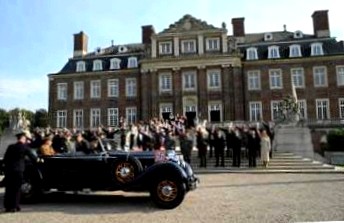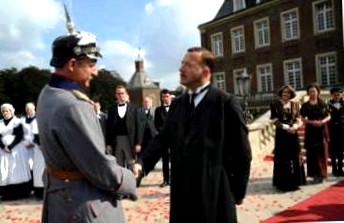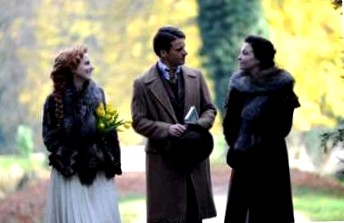Krupp – a german family
In the midst of the economic crisis, zdf celebrates the krupp family of entrepreneurs
They were the arms suppliers for the emperor, the fuhrer and the republic. And because they were good businessmen, they also supplied the respective enemies of germany with their weapons. The krupp name stood for coarseness, power, wealth. But in the end, the family was so rich and their company so powerful that krupp became a problem for the young federal republic. And in the end they abolished themselves, the family business became a foundation, the krupp name went out. Just like the fires in the blast furnaces, of which there are only a few left in germany.
Fritz krupp (fritz karl, center) shows off the heart of the company – the steel hammer – during a tour of the krupp works. At the time when fritz krupp was bleeding, there were several dozen steel hammers in the essen halls; for the filming, just one could be found. Image: stephanie kulbach, zdf
A farewell to the good old days
Of all things, filming began in september for "krupp – a german family". The month that will go down in history as the beginning of the current banking and economic crisis. When the project was launched in the winter of 2007, no one could have guessed that in september the us bank lehman brothers would collapse and trigger an economic crisis whose end is not yet in sight. And yet everything fits together. At the moment, there is a strong sense of longing in germany, a longing for orderly relationships, for strong leaders, for companies that fight for their employees, in short: for the good old days. In the krupp three-parter itself, the good old days appear only in negation. Every female: "the good old days are over". At the end it is even said that krupp is nothing more than a myth, something that the federal republic needs to reflect itself.
Why krupp and why now?
The fact that the history of the krupp family is now being shown on television is a strange coincidence. Because according to gunter van endert, head of the zdf feature film editorial department, the filming of the company and family history of krupp was only a question of time. "Krupp had been floating around as a topic for a long time", says van endert. The question was never whether the history of the krupps would be filmed, but how. "You have to find an approach that is historically true and at the same time produce a round, gripping film that appeals to as many people as possible," says van endert. That’s why we focused on a conflict that highlights the core problem of the krupp family business: the intertwining of family and company, of private and public life. It’s about the suffering and the desire for power, which in the krupp house rests solely on the shoulders of the. The firstborn, because even if there were younger siblings who wanted to get involved in the company, they were tolerated at most as substitutes.
The film’s central theme and frame story is the mother-son conflict between bertha and alfried, which culminates in the dissolution of the family business founded in 1811. In 1966, alfried krupp turns the company into a foundation. So there is no longer a sole heir. There are many reasons for this. Firstly, the heir, alfried’s only son arndt, is persona non grata in the family, coming as he does from a classic mesalliance. The marriage of the krupp heir alfried to the hamburg merchant’s daughter anneliese bahr did not meet the requirements of a dynastically minded family. So alfried’s mother bertha arranged for the marriage to be divorced by forcing alfried to choose between his wife and the company. Secondly, arndt von bohlen was simply not interested in a career as an entrepreneur; he renounced an inheritance of around three billion and instead lived a jet-set life with a severance pay of two million marks a year. Thirdly, the inheritance tax had torn an enormous hole in the company’s coffers.

Krupp’s arms production for the nazis is in full swing and the fuhrer comes to visit villa hugel. Krupp family with their staff welcomes hitler with the hitlergrub on their estate. Picture: stephanie kulbach, zdf
When the company was handed over from gustav krupp to alfried krupp in 1943, inheritance tax had already cost the company a fortune: with corporate assets of over one billion reichsmarks, around 400 million reichsmarks in inheritance tax had been due. The remedy was the so-called "lex krupp" of 1943, also known as the "fuhrer’s decree on the family business of fried. Krupp". The law, which hitler enacted at the instigation of the krupp family, exempted the krupps from inheritance tax and ensured their continued existence as a family business that would be passed on to the respective sole heir. After all, in the middle of the second world war, the survival of germany’s number one arms manufacturer could not be jeopardized.
The emperor as matchmaker
Krupp also roughs emperor wilhelm ii. Had ensured that the company and the family remained inseparably linked and that the krupp name did not die out sooner. Friedrich alfred krupp, better known as fritz krupp, had two daughters, the first-born, bertha, was the sole heir, but with her marriage the name krupp disappeared. So the emperor decreed that the respective head of the family should add the name "krupp" provided that the company remained in the hands of the family. The emperor also chose a suitable husband, and so the diplomat gustav von bohlen und halbach became the company boss gustav krupp von bohlen und halbach after his marriage to bertha krupp.

A distinguished visitor at villa hugel: gustav (heino ferch, r.) receive emperor wilhelm (michael schenk, l.). The emperor himself chose gustav as bertha’s husband and presented him with the "inherited title" krupp furnished. (back, v.R.N.L.: theo trebs, valerie koch and barbara auer). Image: stephanie kulbach, zdf
The film tells all this and much more, and instead of three times ninety minutes, a whole series could easily have been shot. One can’t help but be reminded of the "buddenbrooks"thomas mann’s novel with the subtitle "decay of a family" and its various film adaptations, including one from 1979 in eleven parts for television, the most recent as a rough production for cinema, co-produced by ard [http:.Imdb.Com. And indeed, the novel appears in the film, as a reading for the young krupp sisters bertha and barbara. Their private teacher finds the book simply "scandalous", but barbara’s admirer and later husband tilo von wilmowsky defends this testimony to modernity.

Tilo (stephan luca), barbara (marie zielcke, l.) and bertha (valerie koch, r.) discuss during a walk through the park of the villa hugel about the "buddenbrooks" by thomas mann. Image: stephanie kulbach, zdf
Krupp meets buddenbrooks
Are the krupps zdf’s answer to buddenbrooks?? "No", says gunther van endert, but there were a few family stories whose filming was also a theme. For example, the wertheims, the founders of the modern department store system. As with the krupps, there is not only a family history to be told about the wertheims, but at the same time it is about topics such as the jewish grobburgertum and the creeping aryanization in the third reich. In other words: interesting are the families of entrepreneurs whose fate is interwoven with the history of our country in a fascinating – and sometimes tragic – way.
In fact, given the current economic situation, the krupp saga cannot be viewed simply as a family story. Too pressing is the question of whether family businesses like krupp were still possible today. If one had asked director carlo rola a year ago, he had "perhaps called the schaeffler family, but the schaeffler group overreached itself with the takeover of continental". It is currently in debt to the tune of over 12 billion euros. But basically there is nothing comparable today. And even then the krupps were unique. Unique in their self-image, their conduct and their influence.
Versailles in essen
The dimensions of villa hugel alone, the residence of the krupp family until the nineteen-fifties, make it clear that there is more at stake here than just a bit of wealth. Someone has built his own versailles, deep in the west, far away from berlin, where first the kaiser and later adolf hitler ruled. At times, over 600 employees were employed on the estate. The court ensured a befitting reception for all the international delegations that regularly came to villa hugel to negotiate treaties. Contracts that were concluded directly between krupp and foreign governments.
However, those who had to live in villa hugel also knew the dark side of the gigantic dwelling. The dilapidated heating system in particular is a legend. Things were also pretty cool between people in the krupp house, and descendant sophie moritz gives a good account of her life in the docu "krupp – myth and truth", which is broadcast after the first part of the three-part series, admits in no uncertain terms that she never envied the residents of villa hugel and is glad that she didn’t live in this "icy cold" in this freezing cold.
There is no politicking at villa hugel
Although politicians came in and out of villa hugel and everyone knew that krupp lived off the rustic, the motto in the krupp house was "there is no politicking at (villa) hugel!" business was done with all sides, and even the emperor was astonished to learn that the german soldiers in the boxer rebellion in china were attacked with weapons from krupp, the same weapons they used. Personally, director carlo rola does not think much of the krupps’ motto, especially since they were actively engaged in politics. Only they were not allowed to talk about it and certainly not to ask any question. For him the filming is about "morals and the question: how do i run my business?". Because today many managers had the concept of "ego-ag" leider falsch verstanden. And as for krupp’s self-censorship, rola finds that in germany "too much cowering" is. Just thinking about the subject "surveillance in germany" think of all the cameras on the highways, for example, that record every license plate number. "In my student days", says rola, born in 1958, "there would have been strong protests". So it’s only logical that he turns next to another german myth: gotz von berlichingen. He unmistakably gives his superior a piece of his mind.
Speaking of superiors: zdf also resides on a hill, the lerchenberg in mainz, and there, as one could read everywhere, politics is currently being played quite violently, or more precisely, attempts are being made to fend off political interventions. Roland koch, minister president of hesse and vice chairman of the zdf board of directors, was determined to prevent the contract of zdf editor-in-chief nikolaus brender from being extended beyond 2010. The vote on whether brender should remain at the station was actually supposed to take place last week, but was postponed until the end of march due to current events. Gunther van endert is unfortunately unable to say anything about the "unfortunately nothing to say". He is responsible for the selection of materials, and far be it from him to politicize. And yet it is a remarkable coincidence that now, of all times, in the middle of this debate, the krupp saga is being broadcast, in which the mixing of the private and the public becomes an all-encompassing problem.
